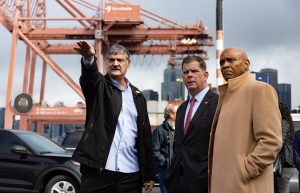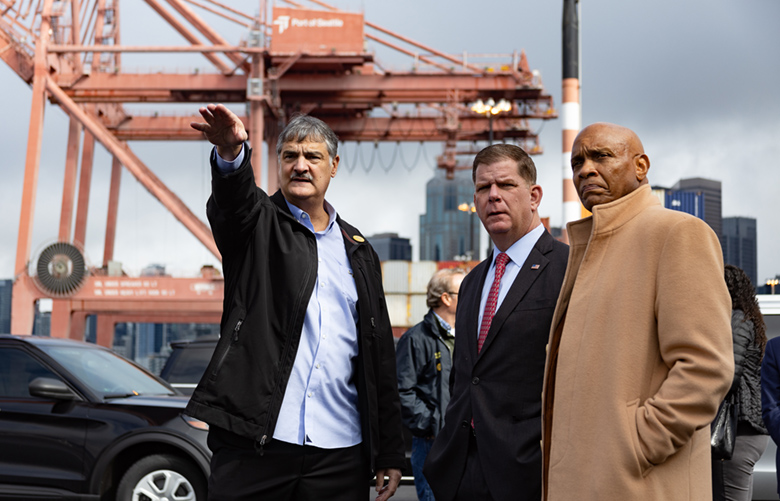
In an era marked by tariffs, a pandemic and a war in Ukraine, those in the maritime industry are bracing for a new disruption to an already strained supply chain: upcoming contract negotiations between West Coast longshore workers and their employers.
During a March 1 session at the TPM22 Conference, GSC Logistics Inc. President David Arsenault and Jonathan Gold, vice president of supply chain and customs policy for the National Retail Federation, pondered what hot-button topics could be discussed at the upcoming talks between the Pacific Maritime Association (PMA) and the International Longshore & Warehouse Union (ILWU), and how shippers can protect themselves from potential disruption.
“This is the one curveball you know is coming, that folks are starting to plan for now,” Gold said. “There’s always something that happens in the supply chain, but this is the one that folks know. There’s unfortunately a long history of actions that happened during the labor negotiations. The hope is that now we can take advantage of the situation.”
As it stands, the current ILWU-PMA contract that covers more than 15,000 dockworkers along 29 West Coast ports is set to expire July 1. Nearly 100 ILWU delegates met in February in Long Beach for its internal caucus. During that time, they discussed and prioritized what to negotiate in a new contract. According to the ILWU, resolutions discussed for the upcoming contract centered around safety, wages, benefits, jurisdiction and technology.
Leaders know what’s at stake. Both sides shared their optimism with Bloomberg News about upcoming talks; ILWU President Willie Adams noted to Bloomberg that they came together to hammer out pandemic protocols that kept cargo moving.
‘It’ll Be Disastrous’
“I think everybody is concerned and rightfully so, if the supply chain is disrupted any further than it is right now, it’ll be disastrous,” PMA Chief Executive Jim McKenna said.
Upcoming negotiations, which are expected to start on May 12, are set to take place in the backdrop of highly publicized congestion at West Coast seaports and two years of sustained peak volumes, Arsenault said.
Still, over the past 15 years, West Coast ports have lost about 17% of their market share, partly due to the 2016 expansion of the Panama Canal and deployment changes as some Asian countries seek alternative routes through the Suez Canal, he said.
“So we’ve really seen a lot of change, and that’s always been something that I think the PMA and the ILWU collaborated about pretty extensively during contract negotiations,” Arsenault said, adding that both sides are “on the same side of the table when it comes to, how do we protect West Coast work jobs (and) employment here because we are seeing some defection as some of this cargo … finds its way into other ports and gateways.”
Both sides are also keeping an eye on early discussions happening between their East and Gulf Coasts counterparts, the International Longshoremen’s Association (ILA) and the United States Maritime Alliance, which are reportedly considering an extension to their contract, set to expire in 2024.
“I’ve heard a number of even as much as a six-year contract extension to deliver some certainty there,” Arsenault said. “So, there’s a little bit of competitive positioning going on even between East Coast and Gulf Coast labor groups that needs to certainly be taken into consideration here. And I think all the parties are keenly aware of this.”
Meanwhile, the ILWU declined the PMA’s offer in November to extend the contract one additional year. The ILWU was careful to say that the decision did not signal anything negative, said Journal of Commerce Senior Editor Bill Mongelluzzo, who moderated the TPM session with Gold and Arsenault.
“(ILWU President) Willie Adams was very careful to say, you know, this does not mean gloom and doom,” Arsenault said. “This means we are going to get together and we are going to come out with a real contract that’s going to stand the test of time.”
The panel also discussed whether the Biden Administration, a pro-labor administration, would affect upcoming talks.
“I think from a labor standpoint, they may feel a bit more empowered that there is a government in position now that will really see things more through a labor lens than perhaps past administrations,” Arsenault said. “But management may be looking at this as, while that may be true, it’s also an election year, and with as much disruption as we’ve seen already in the supply chain, the last thing the administration can afford is an additional disruption, just as we’re recovering from COVID.”
Technology & Automation
Automation is expected to be another hot topic in talks, the panelists said.
“There’s always a fight over what happens with technology and automation, and obviously, if we want to look at how we improve our supply chain, build more resiliency into it, having better visibility…technology/automation is a big part of that,” Gold said.
Regardless of what’s in any contract, management has to really engage labor to make sure there is a common understanding and upfront discussion about where it is they want to go, Arsenault said.
Another thing that Arsenault thinks both management and labor can meet on is the element of safety.
“I think there’s some common ground there that labor and management have got to look at because some of this automation has really led to a safer work environment for the labor on marine terminals,” he said. “And I think that’s something that needs to be embraced.”
Meanwhile, shippers are taking measures to ease the impact of a possible labor disruption.
“We’re seeing the (beneficial cargo owners) and the retailers and any of the cargo interests that are trying to secure capacity through alternative gateways right now,” Arsenault said. “And I think we’ve seen contract negotiations start a little earlier this year than they typically do with the ocean carriers, not because these BCOs feel like they’re getting a great rate, but because right now capacity is a higher priority than rate in most of those discussions.”
However, those alternative ports, including East Coast ports, are starting to see some vessel backups, placing additional pressure on rates, he said.
Retailers are being advised to ship early and shift sourcing, if possible, as well as moving goods via air freight shipping, though that option means dealing with capacity issues, Gold said.
Peak season is likely going to start earlier this year, with retailers planning to build in additional lead times into their supply chain, with or without labor negotiations on the horizon, Arsenault said.
The retail federation sent a letter to the leaders of the ILWU and PMA, encouraging the parties to sit down early and continue to negotiate, even if a deal isn’t done by July 1. Officials there want the parties to remain at the table, pledging to have no disruptions, to provide certainty and stability in the supply chain.
“It’s recognizing how important this negotiation is, not just to the West Coast, but to the U.S. economy as a whole,” Gold said. “We think it’s really important that negotiations start now.”
Arsenault was encouraged by labor and management’s cooperation and communication, which was already happening through the pandemic to reduce the existing backlog.
“I think we’re already going in with an increased level of communication before the hot buttons in the contract negotiations specifically need to get hammered out,” he said. “I would anticipate that there are still some rough seas ahead and still some other element of uncertainty to plan around. But I am optimistic that both sides are going to reach some common middle ground without too much disruption.”

